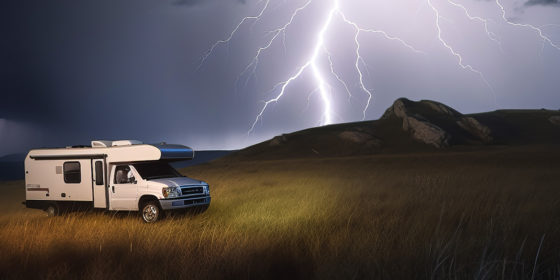How to Prepare your RV for Inclement Weather
4 min read
When it comes to RVing, preparing your vehicle for inclement weather is an important part of staying safe and comfortable on the road. Different kinds of weather requires different types and levels of preparation, depending on whether you are facing extreme cold, heat, snow, rain, wind, and more. Knowing which steps to take to ready your RV for each kind of inclement weather can help you stay safe and enjoy your travels. In this article, RVT will explore the concept of how to prepare for inclement weather in an RV so you can be prepared to handle whatever mother nature throws at you. With the right knowledge and preparation, you can hit the road with confidence no matter what comes your way. Let’s get started!
Rain
Rain is one of the most common weather issues that RVers face. Before traveling during the rainy season, make sure your roof and seams are ready to withstand rainfall so you don’t end up with an expensive leak. Make sure all windows and doors have quality seals to keep water out as well. Consider booking a covered camping area if the weather on your vacation looks questionable. This will provide an added layer of protection against the elements. In addition, consider bringing along tarps and waterproof covers for any outdoor items that you do not want to get wet. This will help protect your belongings, allowing you to enjoy your vacation—even in the rain.
Thunderstorms
Thunderstorms can be unpredictable and intense, so it is important to be prepared. Make sure all of your electronics, documents, and other important items are stored inside, as thunderstorms may crop up with little warning, especially during the summer. It’s also a good idea to have storm protection for your RV to divert lightning away from its body. This can help protect against potential damage from bolts of lightning.
Keeping an eye on the weather forecast prior to your trip can help you plan ahead and prepare for thunderstorms. Following these steps will help to ensure that you stay safe during a thunderstorm in your RV and prevent any potential damage.
Snow
Snow during the winter can be a real hazard for RVs on the road. Therefore, it is important to make sure that your vehicle is properly prepared and equipped before heading out into cold temperatures. Make sure that all of the fluids are topped up and that the mechanical components of your rig are in good working condition. Check the tread depth on your tires—deeper treads mean better traction on icy roads. Additionally, ensure that your RV has enough insulation and heating so that the interior remains warm and comfortable. Lastly, always carry an emergency kit in case of an unexpected breakdown or incident on the road in cold weather.
Hail
Hail storms can be particularly dangerous for RVs, potentially causing extensive damage to the exterior of the vehicle. To ensure that your fifth wheel, campervan, or other RV is as safe as possible, make sure that you are parked in an area with shelter or cover whenever hail is expected. Consider investing in a hail-proof tarp or covering to protect your RV from any falling hail. Finally, it is important to keep an eye on the weather and be ready to move your RV if a storm is coming.
Tornadoes and Hurricanes
Tornadoes and hurricanes can be incredibly dangerous for an RV; these storms are powerful enough to uproot trees and cause extreme property damage. If you live in an area that is prone to these storms, it is important to develop a plan ahead of time on how to best protect your RV before disaster strikes. Consider keeping your RV in a storage unit or inside a garage when not in use, if possible. If this is not feasible, look for other options, such as parking it in your own driveway, against a house or larger structure , or under a carport or covered storage. If these options are still not possible, consider parking it in a friend or family member’s covered driveway or carport while you wait out the storm somewhere safer.
When storing your Class A motorhome or other RV outdoors, make sure to park it away from trees and power lines, as these can become dangerous projectiles during a storm. Consider anchoring it securely to the ground with heavy-duty straps, chains, and tying points. If you live in an area prone to tornadoes or hurricanes, it’s always a great idea to have an emergency plan for your RV, just in case. Make sure to store valuables and important documents off-site and keep any supplies you may need handy before extreme weather is upon you.
Finally, take the time to make sure your RV is properly insured and update its coverage regularly, no matter what type of weather you may face while traveling. Following these tips will help your RV stay safe and secure during inclement weather. Be prepared and stay safe!
Need a new RV? Check out the latest new and used listings at RVT.com.
By Sam Moon



